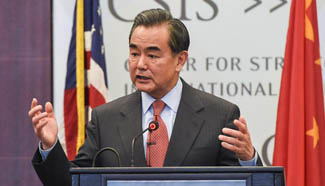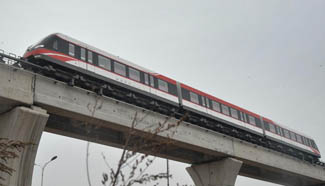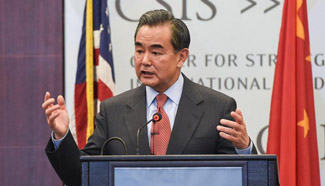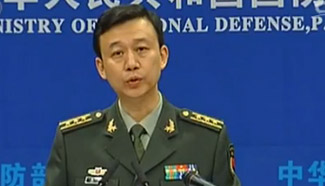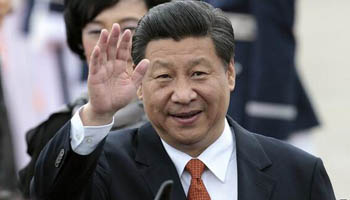??? Q1: We have noticed that, recently, the spokespersons of the US government and military, the US Secretary of State, and Commander of the US Pacific Command said on different occasions that China is militarizing the South China Sea and is stepping up such kind of efforts which have led to rising tensions in the region. What is your comment?
A1: China has sovereignty over the islands in the South China Sea and their adjacent waters. The US often accuses China of militarization. We cannot help but ask: many years ago, some littoral countries of the South China Sea constructed missile sites and radar stations on the islands and reefs that they had illegally occupied and deployed a large number of tanks and artillery. Does this count as militarization? As a country out of the region, the US has dispatched military vessels and aircraft to enter the adjacent waters, airspace and even territorial seas of relevant Chinese islands and reefs, conducting provocations and frequent close-in reconnaissance. Does this count as militarization? The US also leaves no stone unturned in persuading and encouraging its allies and partners to conduct highly targeted joint military exercises and joint maritime patrols in the South China Sea. Does this count as militarization?
The US, while keeping a blind eye to such actions of militarization, makes irresponsible accusations against the lawful and reasonable development of defense facilities by the Chinese side. I can only say that this is typical double-standard.
The Chinese armed forces will faithfully carry out its duties and firmly safeguard national sovereignty and security interests.
Q2: According to Fox News, China has recently deployed J-11 fighter jets and JH-7 fighter bombers to the Yongxing Island of the Xisha Islands. Could you please confirm?
A2: The Xisha Islands are China’s inherent territory and it is China’s legitimate right to deploy defense facilities within its own territory, no matter in the past or at present, no matter on temporary or long-term basis, and no matter what kind of equipment it is. To hype up the reasonable and lawful military activities of the Chinese side by the US is with ulterior motives.
Q3: Recently, deployment of the HQ-9 surface-to-air missile on the Yongxing Island of the Xisha Islands has attracted great attention from western media. US Secretary of State said that he was going to have very serious talk with China on this issue. Why has the deployment resulted in such strong reaction from western countries? What is your response?
A3: We have noticed that recently the US side has made the legitimate defense deployment of China within her own territory a very hot issue, highlighting such weaponry and equipment as surface-to-air missile, radar facilities, various types of aircraft and who knows what else may be hyped up in the future. All these seem to be dazzling. I would like to make the following four points.
First, all these weaponry and equipment are deployed within China’s own territory. Second, deployment of these weaponry and equipment is for defensive purpose. Third, even the US military acknowledges that such deployment is not something new. And fourth, why is it always the US media which report such news first? It is worth a second thought.
Q4: You have mentioned that the deployment of surface-to-air missile system on the Yongxing Island of the Xisha Islands is for self-defense. Do you think it is necessary to deploy such kind of weaponry and equipment on the Nansha Islands as well in future?
Besides, China will build “artificial islands” in the Nansha Islands for the purpose of providing public services for the international community. Will foreign countries be allowed to use the runways on those islands?
A4: China has sovereignty over the islands of the South China Sea and their adjacent waters. This is backed by ample historical and legal evidence. As I have said, since it is Chinese territory, China has the legitimate rights to deploy weaponry on its own territory in the past or at present, temporarily or permanently, and to decide the kind of weaponry and equipment to be deployed.
On your second question, we have repeatedly expounded that there is no such a thing as “artificial island”. China’s construction work on the islands and reefs in the South China Sea are mainly used to serve civilian purposes and provide better public services to the international community. As to the specific question that you have raised, please refer to competent authority of the state.
Q5: On 23rd of this month, the spokesperson of the South Korean Defense Ministry said that the consultation between South Korea and the US on the US deployment of the THAAD missile system in South Korea will enter the final stage and relevant agreement would be signed late this week. Some experts commented that if the THAAD system is deployed on the Korean Peninsula, it may trigger an arms race in the region and it may also affect China-South Korea relationship. What’s your comment?
A5: We are deeply concerned about the possible deployment of the THAAD missile defense system by the US in the Republic of Korea. The X band radar equipped with the THAAD system has a long detection range, which far exceeds the peninsula and reaches as far as inner Asia. This directly endangers China’s strategic security interests and compromises global strategic stability.
We are firmly opposed to any country’s attempt to sabotage China’s legitimate rights and interests with the Korean Peninsula nuclear issue as an excuse. The Chinese armed forces will earnestly fulfill their responsibility and missions and firmly safeguard national security interests.
Q6: There has been some speculation, following China’s building of new runways in the South China Sea and also because of what China views as provocative moves by the United States with its freedom of navigation patrols in the South China Sea, that perhaps China might be close to announcing an air defense identification zone for the South China Sea. Is this something that China is currently considering and when might you announce the air defense identification zone for the South China Sea? Thank you!
A6: We have reiterated our position on establishing an air defense identification zone on many occasions. And here I would like to repeat our position. To establish an air defense identification zone is within the sovereign rights of a country. And whether to establish such a zone and when to establish it depends on the threat that China faces in the air and the level of such kind of threat. And various factors have to be taken into consideration.
Q7: Since the Yongxing Island is claimed to be part of the Chinese territory, will civil air service be created this year to the island in order to develop tourism there? Will the domestic and foreign journalists in China have access to the island to report?
A7: I think your suggestion to develop tourism on the island is a very good idea. But these two questions are not related to national defense or military affairs. I’d like to advise you to refer them to relevant authorities of the state.
Q8: According to foreign media reports, Harris, commander of the US Pacific Command, during a recent hearing of the US Senate Committee on Armed Services, commented on China’s deployment of weaponry and equipment on the islands and reefs in the South China Sea, saying that China is seeking to establish hegemony in East Asia. What is your comment?
A8: China adheres to the road of peaceful development and follows a national defense policy defensive in nature. It is China’s consistent position that disputes in the South China Sea be resolved peacefully through direct negotiations by the parties concerned.
As to hegemony which Admiral Harris talked about, I’d like to ask, if a country’s islands have been occupied by another country for dozens of years, if a country’s coastal waters is under frequent reconnaissance by other countries’ military ships and aircraft, and if a country’s military has never waged a war, could this country be called a hegemonic power?
In China, hegemonism is a word reserved for a certain country. That country is supposed to know well about that.
I also noticed that Admiral Harris made the remarks to get more military budget from the congress. You have the right to do that, which we do not object. But, it is inappropriate to get more money by carelessly smearing China.
Q9: Recently, the US has made lots of provocations against China in military and in public opinions, so will these provocations have any impact on mil-to-mil relations between China and the US? Will they affect China’s participation in the Rim of the Pacific 2016 multilateral joint maritime exercise?
My second question is how is China’s support facilities being built in Djibouti going on?
A9: It is without doubt that there are problems and obstacles in mil-to-mil relationship between China and the US. For example, the arms sale by the US to Taiwan, the close-in reconnaissance against China by US military ships and aircraft, and the discriminatory laws of the US putting limits on mil-to-mil exchange between the two countries.
In particular, the U.S. has arbitrarily sent warships and aircraft to enter the adjacent waters and airspace of relevant islands and reefs in the South China Sea or even enter the territory sea of these islands and reefs. Such actions severely damaged the mutual trust of the two militaries and are also counterproductive to both sides’ efforts to establish the new type of China-US mil-to-mil relationship.
The wrong behavior of the US side on these issues undoubtedly affected China-US mil-to-mil relationship in a negative way. We hope the US side can take concrete measures to stop such wrong behavior and remove the obstacles for developing mil-to-mil relationship as early as possible.
It is in the interests of the people of the two countries to develop China-US mil-to-mil relationship, which is also conducive to regional and world peace and stability.
Currently, China-US mil-to-mil relationship is keeping a good momentum of development. Cooperation has been conducted in exchange of high-level visits, institutionalized interactions, and joint exercises. The two confidence building mechanisms have also made sound progress.
We are ready to work with the US side to strengthen strategic communication, improve mutual trust, and properly deal with differences, so as to push forward the healthy and stable development of the new type of China-US mil-to-mil relationship.
On the Rim of the Pacific joint exercise, we have learned that the Rim of the Pacific 2016 multilateral joint maritime exercise will be held from June 29th to August 4th in Hawaii.
To take part in the joint exercise is conducive for the PLA Navy to strengthen its capabilities of dealing with non-traditional security threats, and to deepen its professional exchanges and pragmatic cooperation with navies from other countries.
China attaches importance to the exercise and will send naval ships to take part in the exercise. Since last year, the Chinese side has sent teams to take part in two planning conferences for the joint exercise, and held consultations with the US side on relevant issues of the Chinese side’s participation.
As to the specific arrangement about China’s participation, we are going to release information in due time.
Through friendly consultations between China and Djibouti, the two sides have reached consensus for China to build support facilities in Djibouti. The facilities will mainly be used for logistical support and personnel recuperation of the Chinese armed forces conducting such missions as maritime escort in the Gulf of Aden and waters off the Somali coast, peacekeeping and humanitarian assistance.
Currently, construction of infrastructure for the support facilities has started, and the Chinese side has dispatched personnel to Djibouti for relevant work.
Q10: Could you give us the update on efforts to cut the size of the Chinese military by 300,000 personnel? When will this cut be carried out and where will these people be moved to?
A10: During the deepening of national defense and military reform, we will increase the decommission quota for military officers. It has already be approved by the Central Military Commission that this year’s work related to transferring military officers to civilian work and demobilizing military officers has already started and the quota of such officers will be increased compared with the previous years.
The work related to transferring military officers to civilian work and demobilizing military officers during the period of national defense and military reform will be conducted in line with the principle of serving the need of the overall reform as well as the need of the armed forces development and also in accordance with the principle of optimizing the structure of the military officers.
We should accomplish the task of downsizing the military in time and also ensure that the officers to be transferred to civilian work can be properly settled down. We will adopt necessary policies and measures to retain the talents for the military while optimizing the structure of our cadre contingent so as to improve the efficiency of the military human resources.
The state as well as the military will adopt a number of preferential policies, expand the channels for settling down the military officers to be transferred to civilian work, and improve the quality of settlement. We believe that the officers of the armed forces have the political sense, awareness of the overall situation and the sense of obeying orders. In the time of reform, they can properly balance their personal interests and the overall interests and demonstrate their quality as well as their sense of responsibilities.
Q11: Henry Harris, Commander of the US Pacific Command, said a couple of days ago that he supported the US military’s plan to conduct regular freedom of navigation patrols in the South China Sea. And if the US continues to dispatch military vessels and aircraft to the South China Sea, will china accelerate the pace of deploying military equipment such as missiles, radars, fighters and even military vessels in the South China Sea?
A11: I came to two conclusions from your question. First, the United States is the real force behind the militarization of the South China Sea. And, second, it is very necessary for China to deploy defense facilities on the islands and reefs of the South China Sea.
Q12: It is reported that during the Spring Festival, the Chinese Navy chartered a plane for the first time to get back a soldier named Wang Xinsong who has been seriously ill from Djibouti. What is his current status? Australia has published its national defense white paper, in which it not only talked about the Australian defense budget for the next ten years, and also Australia’s security concerns in its neighboring regions, for example, the disputes in the South China Sea, the frictions between China and the US. The white paper also urged China to be more transparent in its national defense policies. What is your comment?
A12: During the Spring Festival holidays, Wang Xinsong, a soldiers working in the mechanical and electrical department of the PLA Navy Ship Qingdao, which is conducting naval escort missions in the Gulf of Aden, suddenly fell ill. On Feb. 10., Wang was transferred to a local hospital in Djibouti. It was difficult to control his illness as a result of limited medical capacities in the local hospital, and he was in a very critical condition. Relevant departments of the PLA Navy immediately coordinated with the international SOS Organization and chartered its medical plane to bring back Wang Xinsong on Feb. 17. He was immediately sent to the Intensive Care Unit in the General Hospital of the PLA Navy, where he was treated by a group of military and civilian medical experts. Currently, Wang Xinsong is out of danger and in a stable and improving condition. He will continue to receive treatment and we hope to see him recover as soon as possible.
I’d like to stress that life is the most precious thing and its value cannot be judged by money. Soldiers serve the country and the country provides shelter and protection for them. No matter where they are serving, the motherland will not forget them.
On your second question, we have noticed that the new edition of Australia’s defense white paper made comments upon such issues such as the development of China’s armed forces, China’s constructions on the islands and reefs of the South China Sea, China-Australia military-to-military relationship, and also the security situation in the Asia-Pacific. Here I would make some initial comments. First, we’re seriously concerned about the contents in the white paper that touches upon the issue of South China Sea. And we are firmly opposed to the accusations against China’s construction activities on the islands and reefs in the South China Sea. The islands and reefs in the South China Sea are inherent Chinese territory from ancient times. China’s construction activities on these islands and reefs are conducted on its own territory and within its sovereign rights. The South China Sea issue is not an issue between China and Australia, and the freedom of navigation enjoyed by all countries including Australia in accordance with international law has never been affected before and will not be affected in the future. We urge the Australian side to cherish the hard-won good momentum of development in bilateral relations, and don’t take part in or conduct any activities that may compromise the stability in the region. Secondly, some of the speculations the Australian side has made on the Chinese armed forces do not accord with the facts. China’s purpose to develop its armed forces and strengthen national defense is to better protect national security, sovereignty, territorial integrity and also to provide solid guarantee for the peaceful development of the country. In recent years, China has proactively fulfilled international obligations and has taken part in such operations as the UN peacekeeping, the naval escort missions and also humanitarian assistance and disaster relief efforts to provide many public services to the international community. Besides, through establishing information release mechanism and publishing defense white papers, China has made introduction to the international community on China’s national defense policies and armed forces development.
Thirdly, the military alliance between Australia and the US should get rid of the cold war mentality and this alliance should neither target any third party nor should it compromise the interests of any third party. The armed forces of China and Australia are both located in the Asia-Pacific region, and share important common interests and have a huge potential for future cooperation. The armed forces of the two countries should further strengthen strategic communication and enhance exchange and cooperation in various areas, so as to push forward stable and healthy development of military-to-military relations.
We will continue to thoroughly review the contents of the defense white paper of Australia.
Q13:Recently, Zika virus has been spreading in some Latin American countries. By now, mainland China has confirmed 5 imported Zika virus infection cases, pointing to a severe challenge for epidemic prevention and control. Please brief us on the Chinese military’s participation in Zika prevention and control.
A13: Recently, Zika virus infection cases have been confirmed in many countries in America, Europe, Asia and Oceania. In China, imported Zika virus infection cases have also been found in Guangdong, Jiangxi and Zhejiang provinces.
Facing this emergency situation, the military and the civilian sectors closely cooperated with each other. After obtaining clinical samples of Zika patients, the Academy of Military Medical Science was able to extract complete genome sequence of the virus directly from urine on Feb. 21, providing important proof for the origin and evolution of the virus. It can be used for research and development of diagnostics, vaccine and medicine.
The medical institutions and experts of the Chinese armed forces will continue to make good use of the their advantages, strengthen cooperation with domestic and foreign experts, and proactively carry out relevant research and disease control and prevention, so as to make contributions to the global fight against the Zika virus.
Q14: You have said that this year’s work related to officers to be transferred to civilian work has started and the quota will be increased. Could you please tell us how many percentage of increase is there going to be? And will all the 300, 000 downsized military personnel leave the military in such a way of being transferred to the civilian work?
Secondly, according to the Reuters’ report, the national defense budget this year will witness a dramatic increase. If that’s true, will the salary for service members be increased as well?
Thirdly, it is said that the situation on the Korean Peninsula is deteriorating and the war is just around the corner. Will the Chinese military adopt measures in the China-DPRK border area to safeguard the safety of its territory and people?
A14: As to the first question, I do not have the specific number or the ratio of increase for this year’s quota for officers to be transferred to civilian work at hand to tell you.
As to the second question, as we have learned, the actual defense budget for this year hasn’t been submitted to the National People’s Congress for deliberation. So, I can’t provide any answer to your question.
China’s position on Korean Peninsula issue is consistent and clear, that is, we adhere to seeing a nuclear-free, peaceful and stable Korean Peninsula, and we adhere to resolving disputes peacefully through dialogue and negotiation.
It is in the interests of no one to see chaos or even war on the Korean Peninsula. We hope relevant parties can do more for promoting dialogue and improving mutual trust, and do more for maintaining peace and stability on the Korean Peninsula. The Chinese military will firmly safeguard national security interests, and maintain peace and stability in the border region.
Q15: According to the vice mayor of the Sansha City, the capital city of Yongxing Island, a part of the military airport on the island has been converted into civil airport. Could you please confirm that? Are there military airports being converted into civil ones?
A15: Currently, I’m not aware of the situation that you have mentioned. If I get any information, I will get back to you.
Q16:Could you please brief us on the missions for the newly established Eastern Theater Command?
A16: The military theater command, as the sole and supreme organ for joint operational command in a certain strategic direction, is established to meet the requirements of combining peace-time and war-time capabilities, maintaining constant readiness, and being professional, agile as well as highly efficient. The mission for the military theater commands is to cope with the security threats in a certain strategic direction, to maintain peace, and to deter and win wars.
Q17: During the national defense and military reform, will the policies of transferring military officers to civilian work be changed? If so, what are the changes?
A17: Currently, we don’t have information to release on policies of transferring military officers to civilian work, and we will release information in due time.
Q18: According to the Views on Deepening National Defense and Military Reform of the Central Military Commission, the reform tasks of the current stage will be basically completed by 2016. By now, a quarter of the year 2016 has passed. What are the progresses in this year’s reform? And could you brief us on the theater commands’ work in performing duties and missions since their establishment?
A18: First, let’s talk about the mathematics. Only two months have passed, that is, one sixth of this year has passed. Actually, we have made lots of progress in military reform during the past two months.
For example, the leading organs for the PLA Army, the PLA Rocket Force and the PLA Strategic Support Force have all been set up. The adjustment of the organs for the Central Military Commission has been basically completed. And the conference for establishing the new theater commands has been held. Next, the reform will continue to be steadily pushed forward in phases according to the overall goals and requirements.
Q19: Recently, the US has tightened up its military deployment in South Korea, and will conduct a number of military exercises with South Korea. The South Korean media quoted an official from South Korea’s Defense Ministry, saying that China and Russia may conduct a joint exercise as a reaction. Could you please confirm?
Second question, the US officials said publicly that it is going to regularly patrol the South China Sea. Previously, as the US ships illegally sailed into the waters of China’s islands and reefs in the South China Sea, the Chinese military took such measures as expelling the US ships by shouting slogans or sending warnings. Do you think this kind of counter measure is enough to stop the US military ships from coming again? Whether such kind of counter measures encouraged the US provocative actions in the South China Sea?
A19: On the first question, I read lots of such kind of reports, and they are all speculative reports.
And on the second question I will repeat the two conclusions that I have reached earlier. First, the US is the real force behind the militarization of the South China Sea, and secondly, it is indeed very necessary for China to deploy defense facilities on relevant islands and reefs in the South China Sea.
Q20: Will China or the Chinese military authorize foreign journalists to go to Yongxing Island or other islands and reefs in the South China Sea to report?
A20: As I said just now, on the question about providing service for foreign journalists in China, I’d like you to refer to the competent authority.
Q21: When we came to this building, we noticed that the name of the office building has been changed to the Office for International Military Cooperation. Could you please brief us on the new responsibilities of the Office?
A21: As I have said before, during this round of reform, the Office for International Military Cooperation was established with the previous Foreign Affairs Office of the Ministry of National Defense as a foundation. And its main function is to take charge of the exchange and cooperation with foreign militaries and also the management and coordination of the military’s foreign affairs.



